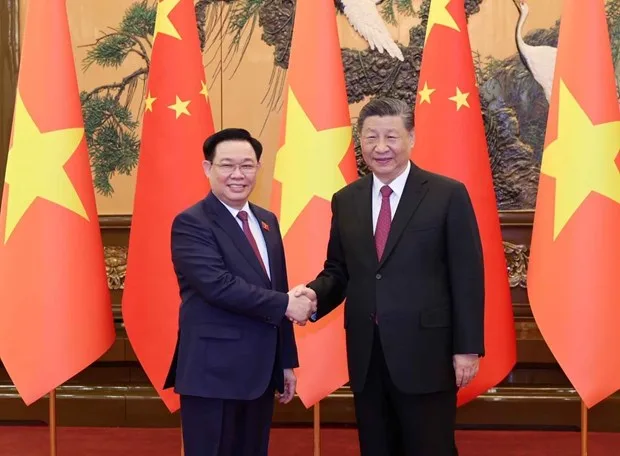On April 8, 2024, the Chairman of Vietnam’s National Assembly (NA), Vuong Dinh Hue, met with the President of China, Xi Jinping, in Beijing, China. The meeting was part of Vuong Dinh Hue’s week-long visit to China. The meeting focused on furthering development and trade projects between China and Vietnam.
China’s Support for Bilateral Ties
Xi Jinping conveyed his regards to the General Secretary of the Communist Party of Vietnam (CPV), Nguyen Phu Trong. He further acknowledged Vietnam’s socio-economic progress under Trong’s leadership and congratulated the party for its exemplary work. Referring to his Vietnam visit in 2023, President Jinping recalled Secretary Trong’s insistence on building a strong China-Vietnam community of shared values that has strategic significance.
President Jinping pointed out how working towards a shared future will boost bilateral ties in six primary ways: higher political trust, deeper practical collaboration, substantial defence-security cooperation, a stronger social foundation, controlled and resolved differences, and closer multilateral coordination.
President Jinping highlighted how China and Vietnam have a long history of comradeship and brotherhood. He encouraged joint efforts to build the China-Vietnam community to boost modernisation in the respective countries, strengthen people-to-people ties, and significantly contribute to the global socialist case.
President Jinping also affirmed that both countries are implementing the consensus built between him and Secretary Trong last year. In continuation of the same, President Jinping promised to foster synergy between the ‘Two Corridors and One Economic Circle’ strategy and the ‘Belt and Road Initiative’.
Vietnam’s Bilateral Ties with China
Vuong Dinh Hue highlighted how improved relations with China have been Vietnam’s top priority. It goes in tandem with Vietnam’s foreign policy of self-reliance, independence, cooperation and development, peace, diversification, and multilateralism in foreign relations.
To maintain the same, Chairman Hue proposed several steps to bolster the bilateral ties between the two countries. He suggested that both countries improve political trust and increase collaborations and exchanges through the government, the party, the parliament, and other channels. He also indicated that diplomacy, defence, and public security should be strengthened.
Chairman Hue also suggested that expanding goods imports, boosting trade, strengthening connectivity between Vietnam and the principal development strategies of China, linking railways, highways, sea, and air, and enabling cooperation in monetary, financial, and digital transformation would surely boost bilateral cooperation between the two countries. Chairman Hue also proposed advancing people-to-people exchanges and increasing the involvement of Chinese and Vietnamese legislators to resolve previous differences between the two countries.
Positive Outlook
China agreed to work on building strategic connections with Vietnam, especially in the fields of railways, smart border gates, the digital economy, essential minerals, green energy, and emerging industries. China also acknowledged the importance of the legislatures of both countries in boosting bilateral ties. Hence, China welcomed the NA of Vietnam and the National People’s Congress of China to sign a cooperation agreement considering the above requirements. President Xi insisted on mutual cooperation to promote exchanges among the youth of both countries to work towards an improved socialist system.
China is an important trading partner for Vietnam. It is also a principal import source for Vietnam’s manufacturing sector. These high-level meetings boost bilateral cooperation promoting global peace and security.









